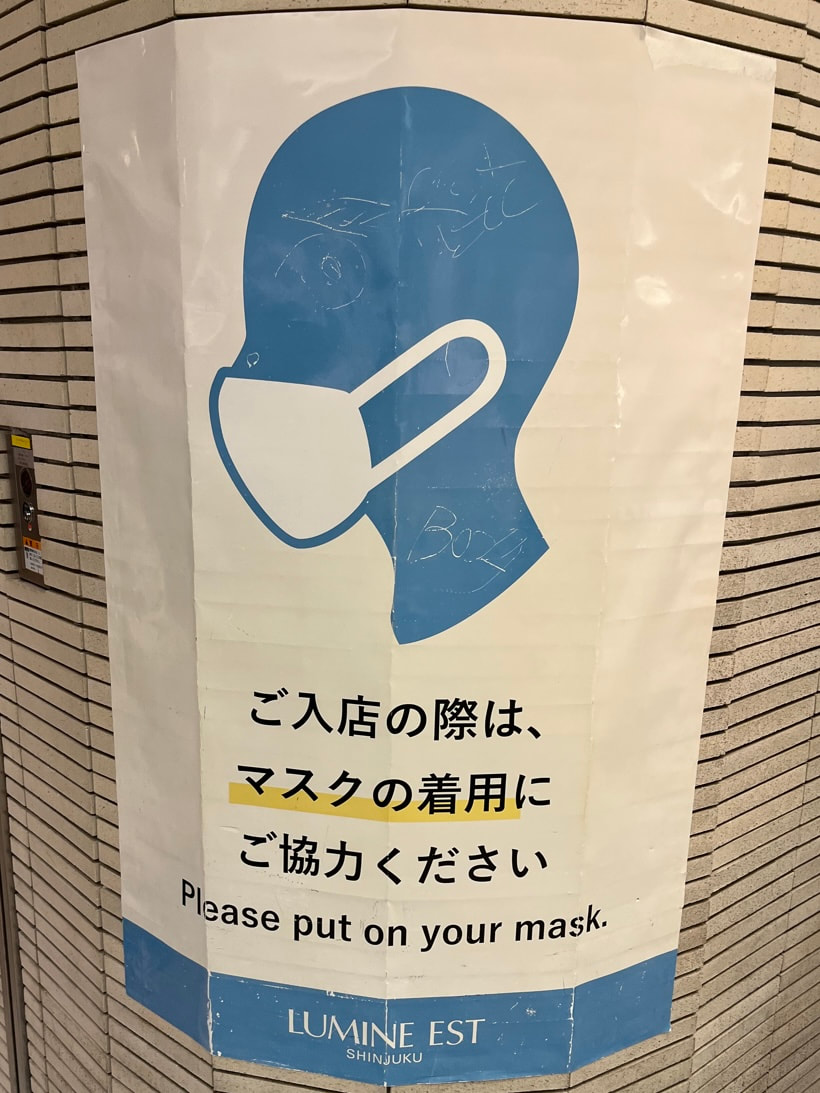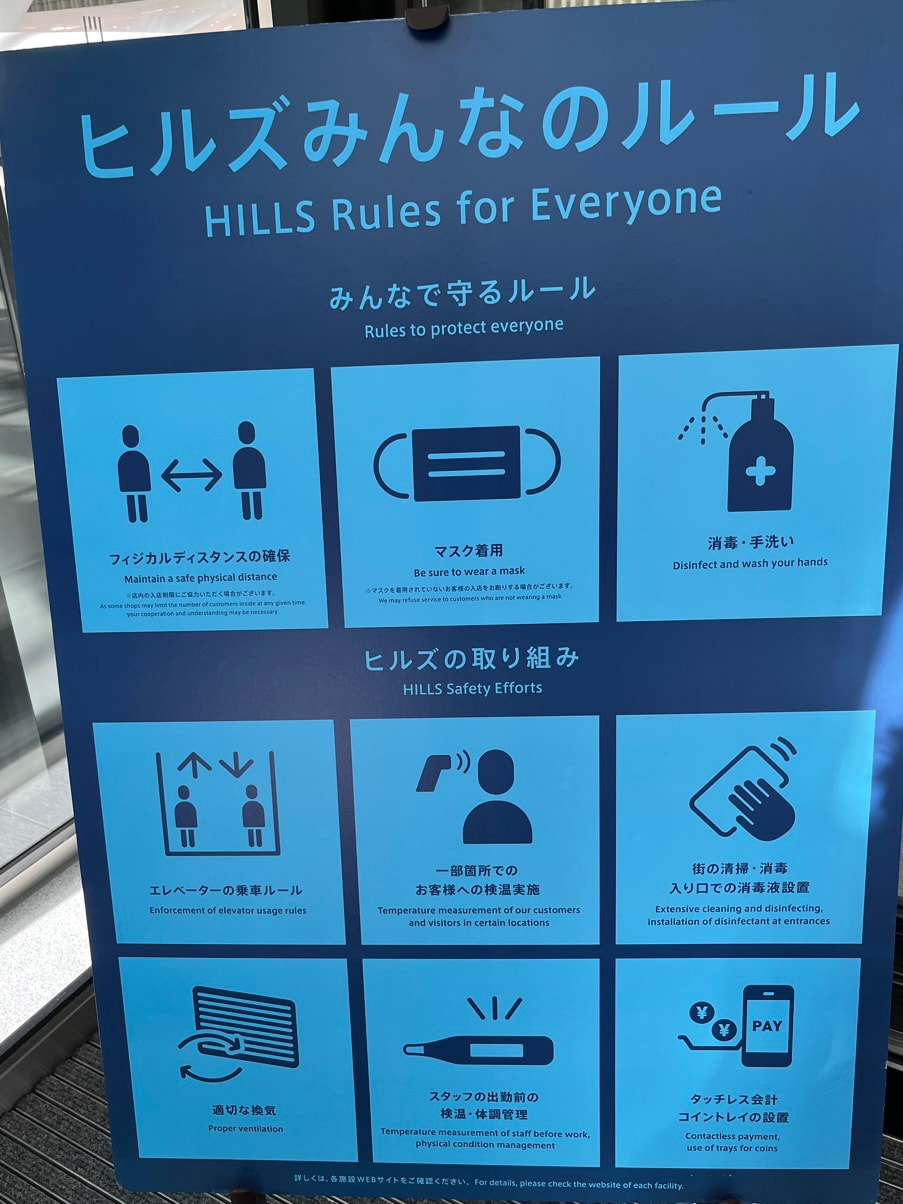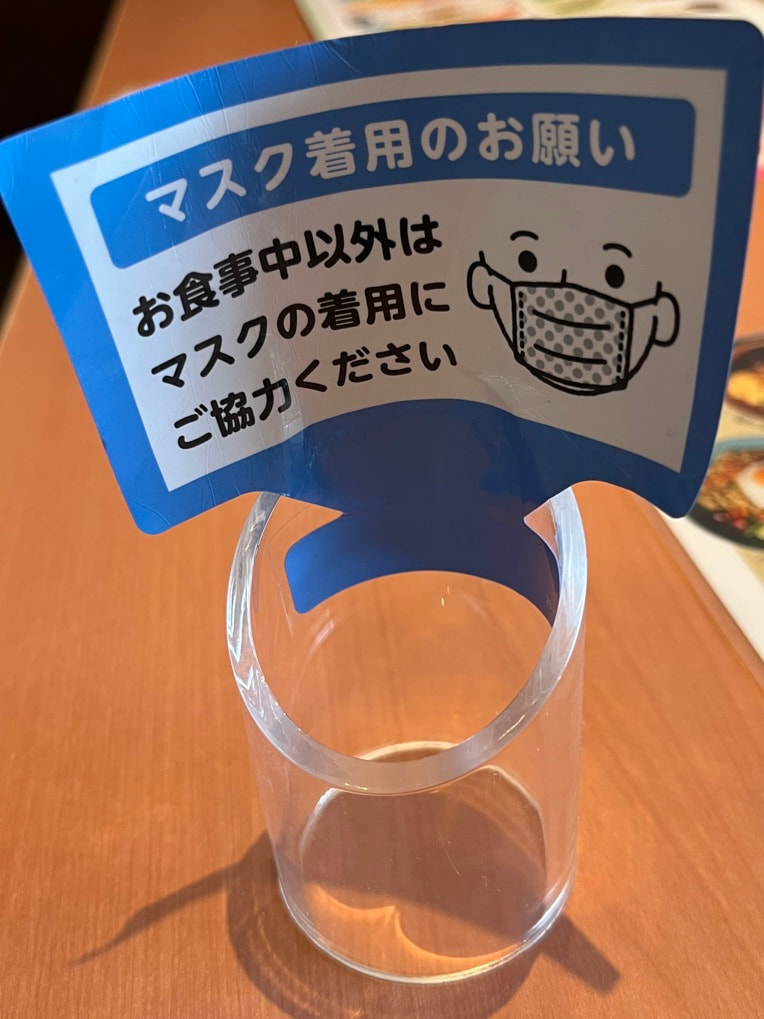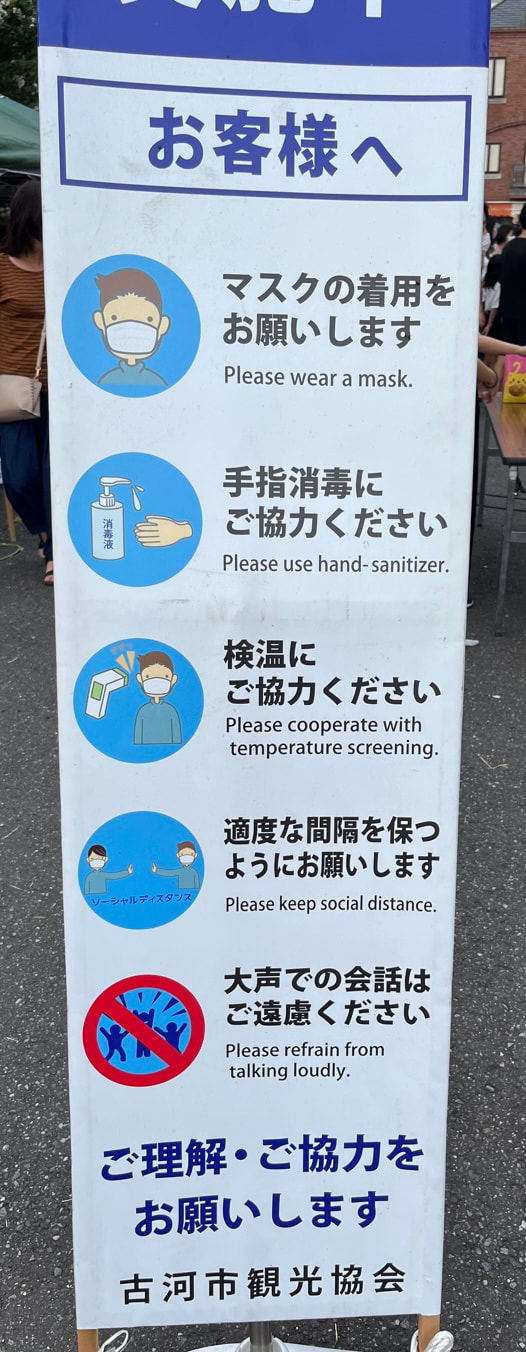September 25, 2022: Masks Will Not Go Away From Japan
When the emperor appeared maskless at the funeral of queen Elisabeth, this was headline news in Japanese newspapers. And the only people I saw without masks during a recent visit to Tokyo were a group of Russian tourists and a couple in Kabukicho, but they were kissing. But now that the COVID-19 pandemic is slowly abating, you will not be required to wear a mask in Japan any more. Right?
Not so fast. It is true that people do not always wear masks in their own neighborhood or while eating. But as soon as they are going to interact with strangers, they put on a mask. Even to go to the restaurant toilet.
Even if wearing masks is not mandatory any more, they are still recommended indoors and on public transport. And many establishments take it one step further, requiring people to wear masks if they want to enter a store or restaurant. Or, as in the picture, the entire Mori Toranomon Tower building.
Even if wearing masks is not mandatory any more, they are still recommended indoors and on public transport. And many establishments take it one step further, requiring people to wear masks if they want to enter a store or restaurant. Or, as in the picture, the entire Mori Toranomon Tower building.
The Japanese have, of course, worn masks in public since at least the early 90’s. Even before the pandemic people in masks were a common sight, especially during hayfever season.
The Japanese used to wear masks for two reasons: Not to get infected, and not to infect others. Even though a mask worn by a person with a cold becomes pretty yucky, this was preferable to staying away from work. Until the pandemic, when telework finally took root in Japan and working from home became so common it started to change the commuting and living patterns. Nowadays, the commuter trains even have announcements requesting anyone who feels sick to stay home and work remotely.
The Japanese used to wear masks for two reasons: Not to get infected, and not to infect others. Even though a mask worn by a person with a cold becomes pretty yucky, this was preferable to staying away from work. Until the pandemic, when telework finally took root in Japan and working from home became so common it started to change the commuting and living patterns. Nowadays, the commuter trains even have announcements requesting anyone who feels sick to stay home and work remotely.
When you enter a shop, or restaurant, or other building there is typically a bottle of disinfectant in the entrance. While disinfecting your hands is usually voluntary, restaurants in particular require guests to do it, and will also take your temperature to make sure you are not infected (although Covid is more infectious before the symptoms appear).
The disinfectant started appearing long before the pandemic, after the Great Northeast Japan Earthquake in March 2011. Disinfecting your hands became important to make sure any infections were controlled. They stayed, because the effect in keeping down the annual flu season was so noticeable that they remained a recommendation. But when the pandemic started, the demand increased so much that the factories ran out. Sake breweries and other manufacturers offered to step up, but rubbing alcohol is not drinking alcohol, and the biggest inventions turned out to happen in the dispensers, where the combination of alcohol dispenser and thermometer has become particularly popular.
In a country where people wear masks everywhere, it is not very likely that they will suddenly stop. And while you will not get arrested for not wearing a mask, those Russians would have had a hard time entering a store. Sometimes people do take the law into their own hands, and occasionally there are fights, mostly on the trains, when someone refuses to wear a mask.
The restriction on entering stores and restaurants without will likely continue, long after the pandemic is gone. So you had better bring a few, and stock up as soon as you have landed. Going unmasked everywhere is not an option. Unless you plan on a walking holiday and staying most of the time outdoors.
In a country where people wear masks everywhere, it is not very likely that they will suddenly stop. And while you will not get arrested for not wearing a mask, those Russians would have had a hard time entering a store. Sometimes people do take the law into their own hands, and occasionally there are fights, mostly on the trains, when someone refuses to wear a mask.
The restriction on entering stores and restaurants without will likely continue, long after the pandemic is gone. So you had better bring a few, and stock up as soon as you have landed. Going unmasked everywhere is not an option. Unless you plan on a walking holiday and staying most of the time outdoors.
UPDATE: It Is Not About Mask Efficiency
When I posted this on Facebook, I got quite a lot of comments in some groups. The number of “likes” outnumber the comments by about a hundred to one, but the interesting thing is that all commrnts fall in one of two categories: “I saw that myself when I was in Japan”, and “Whatever you say, I do not believe masks work, and I have to tell everyone about it”.
the poibt, however, is really not werher masks work or not. It is whether they are required or not - and they are. If you try to walk into a store or restaurant without a mask, you will probably not be served, and either the guards or the other guests will probably work together to throw you out. Masks are socially required, not due to their efficiency, but because everyone is expected to use them.
the poibt, however, is really not werher masks work or not. It is whether they are required or not - and they are. If you try to walk into a store or restaurant without a mask, you will probably not be served, and either the guards or the other guests will probably work together to throw you out. Masks are socially required, not due to their efficiency, but because everyone is expected to use them.




